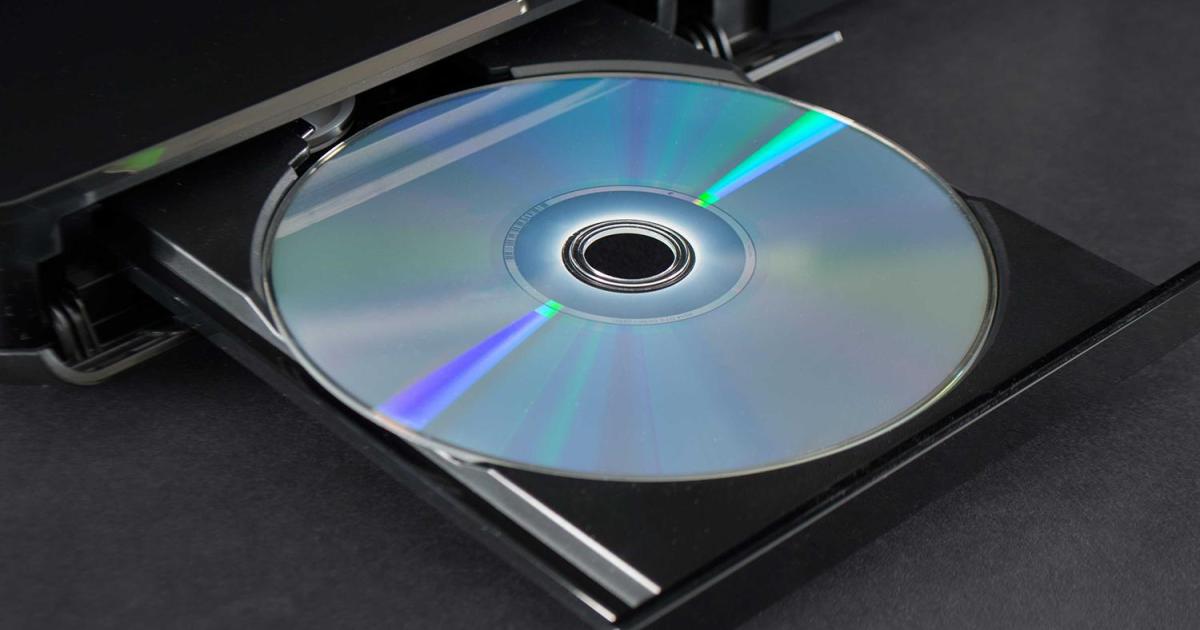That’s enough to store a high detail photo of every single man and woman posing naked in every possible position and combination of positions. And it lasts 10 years like parts of some CDs and DVDs did? Wow! Incredible!
Those you’d like to see naked are usually not single
Mildly infuriating photo of the disc being inserted upside down.
Double sided disks look like this
You seem like you’ve handled quite a few double-sided disks in your day.
Which this probably is if they want to pack as much data as possible in one unit.
14000 4k movies… How many football fields is that?
or maybe… how many terabytes…
1.6 Petabits or 200TB
The article says “What is that in terms humans understand,” then does some math, and produces the figure of 14000 4k movies.
I’m a human and 200TB makes a lot more sense to me than 14000 4k movies. That isn’t a standard unit. 14000 4k movies means nothing. You can have a 4k movie that’s 200GB (that’d be 2.8PB) or 2GB (that’d be 28TB). What’s the bit rate? In the article they mentioned that they just assumed that a 4k 2 hour long movie is 14GB.
What I’m way more concerned about is how expensive the disks and readers/writers are. According to the article, the disks are manufactured similarly to the CD, but what about the readers/writers? Could we see these as competitors to HDDs? 200TB is friggin insane, at a good price you’d be spending 2 grand on that much HDD storage.
In the article they mentioned that they just assumed that a 4k 2 hour long movie is 14GB.
That’s more what I would expect out of a 1080p movie on a disc. If I have 200TB to play with, I’m not going to care much about compressing the video any more than what the disc it originally came off of was at since artifacts could be introduced. Sure, I probably wouldn’t notice most artifacts, but with that much storage even the massive 100GB rips would be a drop in the bucket so why risk it?
Could we see these as competitors to HDDs? 200TB is friggin insane, at a good price you’d be spending 2 grand on that much HDD storage.
I doubt it would compete with HDD for home use. Loading times off of optical discs are atrocious. Just archiving data, sure, but my HDDs actually still have games on them that I run. Old games, sure, but not something where more storage would be worth the reduced read/write speeds. Maybe for a home video server, but that’s about it, and there’s going to be some significant loading compared to current servers with HDDs.
Yeah, for sure, I look for my larger files when I’m legally obtaining my movies.
I’d definitely have a place for them in my NAS, if they were much cheaper than HDDs. It’d be like an SSD cache to go with your HDDs, but a third slower tier for rarely accessed files.
New optical-disks able to hold a shit ton more storage sounds cool, until you realize you probably ain’t gonna be seeing widespread adoption of it among the general public due to cloud storage and things like that, so if it ever does become publicly available it’ll cost way too much.
Yeah, that’s going to be the thing. LTO tapes/drives would be dirt cheap if the demand was anywhere near where DVDs were at their peak
Cloud storage gets very expensive when you need to backup tens or hundreds of terabytes. You need very fast internet and you still need a local backup too. A second NAS and a tape drive will probably be cheaper than this new optical drive though.
Cloud storage is just someone else’s computer. That someone else is who the target market for something like this is. Server farms need a lot of storage, and that takes up space. Optical storage of that capacity is great for data you need to read often, which is the vast majority of data on servers.
That’s what the article said.
The DVD.
It finally hit the corner straight on.
These would be great for backups if they’re cheap enough.
It would also be cool to see a comeback of those old optical disc overlay file systems that let you treat the file system on read-only media as if it was mutable.
It would certainly be a fun challenge to design a modern file system on top of append only media.
With that said, I’m very concerned about cost. It’s hard to imagine this seeing mass adoption.
How great would it be to include a Case Logic binder in a safety deposit box.
I wonder what the longevity of one of these discs is? The article says they can be manufactured in regular DVD production facilities, so it probably depends on the material used (which I think can range).
If they could combine something close to this data capacity level with the M-DISC standard (which supposedly last for about 1,000 years once you take into account the organic ingredients) that would be fantastic.
There’s no point making it last 1000 years since there won’t be any working drives by then. You usually need to move data to a newer format every 15-30 years. Look how hard it is to recover data from 8" floppy disks or old tape formats now.
Tape storage 100% is still a thing and is valued for a lot of truly critical data.
Also, WAY too much critical infrastructure still depends on floppy drives because… there is not a good reason to upgrade the hardware when they need data on the order of hundreds of kilobytes every couple of months.
Storage with purpose will be preserved. Maybe not in a computer sold in best buy but very much in “computing” as a whole.
I can’t think of any situation where THIS disc is useful. But optical drives themselves are 100% going to remain a thing because they provide write once data storage (and OS installation) which is incredibly useful in secure environments.
Tape is still very popular. There has been a new LTO version released every few years. The recent ones are only backwards compatible with the previous version and the older ones supported 2 previous generations. If you need to read 20 year old data from an LTO tape, you will have to find an old drive that’s compatible with that version.
There is a surprising amount of equipment still reliant on 3.5" floppy disks. Unfortunately it’s getting much harder to find new old stock disks. Many of the older disks are degrading now. I’ve had some where a lot of the magnetic material gets worn off after a single read. At least there are floppy drive emulators now that can be used to prolong the life of older equipment as long as it doesn’t use a weird format or interface.
This 1000 years thing is how (at least on paper) the main components of the medium can chemically stay intact and bonded together. You want this as stable as possible since more stability means more resistance to outside forces like moisture and such. Most discs suffering from disc rot today had a number between 5 years (baaaaad) and 200 years (still not great) and are decaying now.
So don’t take things like this too literally.
I think its still usless imo.
200TB, I can literally put this in a single S3 bucket.
Physical media in my opinion is outdated.
You can give it to Amazon, so physical media is useless? Seriously?
I do see flaws with this much data density on an optical disc, mainly physical damage, but physical media will always have it’s place.
If you have like 1-2 petabytes of data to upload to amazaon, sure, they have that special truck you can use. Otherwise, 200tb, i think it would be faster to upload it rather than travel to their offices.
And dont forget its only going to get even faster. Whilst the media isnt going to get bigger at the same rate.
Whatever happened to actually keeping your own data instead of entrusting a megacorporation which puts profit over everything else with it.
Why store data on media when you can pay the price of a sizable mortgage payment for someone else to store it for you?
You do know its much safer and much more highly available to store it in a cloud rather than a piece of plastic, right? In a cloud you get it raided on multiple sites, etc… obv. Depends on how much you pay. Dont forget that CDs in their best of best conditions had a lifetime of merely 10 years. Dont know how much this new media holds with such density…
And you do own the data, read the contracts.
I’m not saying you don’t own the data, I’m saying it’s more expensive than storing it yourself. Obviously it depends on the purpose and budget; if you need it to be highly available and secure, and you have thousands of dollars to direct to the project, the cloud is great. If you want to make a backup of all your DVDs that fits on a single disc, it might be overkill.
The sort of data suited to discs like this is probably pretty different than the sort of data suited to an S3 bucket. It could make a decent tertiary backup though, a local copy of your data stored on offline media can be a lifesaver.
This isn’t a competing technology to the cloud, it’s complimentary.
Unless you physical control your media, you don’t own your data.
Yea just store data on very trustworthy servers like google and Microsoft who would never sell your asscheekprint to their 783 partners for advertising anoNymOuSly
I’m imagining the RPMs on these babies trying things trying to load Gigs worth of data at a time. I like to think it will start glowing from the heat generated.
You’re just sitting on your couch, trying to watch a movie, when your blu ray player suddenly begins to sound like a leaf blower, until a glowing hot disk of destruction shoots through the tray at fourty thousand rpm, ripping through your walls, decapitating your neighbor and taking down some sattelites in orbit
Sounds like a plan.
I really wasn’t interested in this product until reading this comment.
1.4Pb (~175TB), the quoted number of movies is based on a 14GB movie which is very small (most BluRay disks hold somewhere between 25 and 50GB) and no discussion about write speed, so basically this is cool research that someone has done and is no closer to a commercial product that any of the dozens of other articles that have come out on this topic in the last 15 years
These aren’t really trying to target a commercial product, at least not anyway. For now these are of interest to enterprises.
I could see them being archival backups for TV broadcast, quite a few are still using tapes for long term archive.
From the article:
What’s almost more remarkable is that the scientists say a single new blank disc can be manufactured using conventional DVD mass production techniques within six minutes.
If this was a response to write speeds they meant the speed at which data can be written to the disc, not the time ot takes to build the disc. Read/Write speeds are a standard measure used to tell whether something would be efficient to use. For example one could say storing an OS on a DVD and booting would be dumb because it would run extremely slow, where as the read speed for playing music or a movie off it wouldn’t be an issue as it doesn’t need higher performance for such.
And I believe 4k blurays are on average around 100 gb? So that will be about 1800-2000 movies. Still a lot, but not the 14.000 they say.
The rips I pirate aren’t re-encoded and are usually in the range of 50-75GB, depending on the length of the film.
Hmm, interesting. I guess on actual Blurays they would have space for extras, menus, sometimes different dubs etc, so that makes sense!
I rip enough physical media to tell you that post-compression 14GB is not far from average for a 4K movie. I guarantee that Netflix isn’t storing those any bigger than that. Hard drives don’t grow on trees, you know?
It’s still good to know where the top end of optical storage is, even at an academic level, even if these end up not being widely used or being used for specific applications at smaller capacities. We’ll see where or if they resurface next, but I’m pretty sure we’re not gonna get femtosecond lasers built into our laptops anytime soon.
Streaming services definitely don’t give you full quality files. They’re compressed to save bandwidth. Netflix only uses about 7GB per hour in 4k. That’s about the exact size of the higher quality 1080p movies I download.
It’s usually less than 7gb per hour, it ranges from 2 to 7GB, it adjusts butrate on the fly. Netflix quality sucks.
Edit: realized I typed butrate instead of bitrate, it fits, so I’m leaving it.
Yeah it’s fine, especially with recent codecs like AV1 and you’d expect future codecs to improve further.
I can’t comprehend it. Please elaborate it in numbers of an average-sized white truffle.
deleted by creator
Call me when you can buy a spindle with 100 for $50
Lol… my though exactly.
I hope they come in vacuum cases, or the scratch is gonna hurt
Woops you scratched 1.5TB off the disc
I won’t go back to spinning storage ever.
Is it not tempting as a safe alternative to failure prone drives for long term storage?























